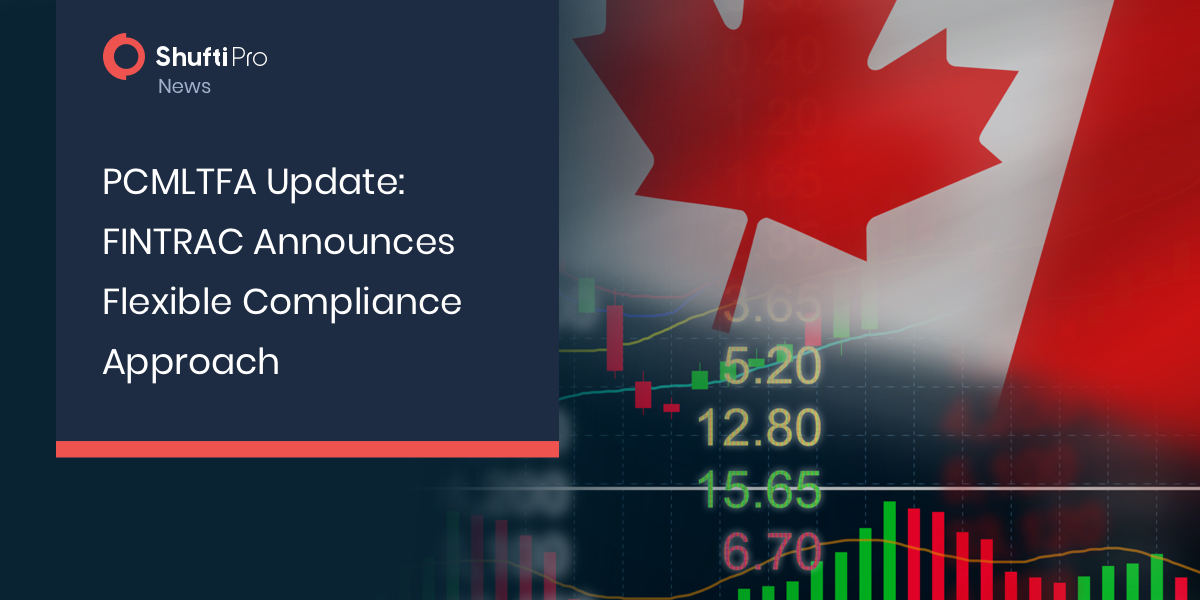PCMLTFA Update: FINTRAC Announces Flexible Compliance Approach

On May 28, 2021, FINTRAC announced changes in Canada’s anti-money laundering regime under the Proceeds of Crime (Money Laundering) and Terrorist Financing Act (PCMLTFA). The amendments made by the Financial Transactions and Reports Analysis Centre of Canada (FINTRAC) have come into effect from June 1, 2021. The new guidance was published keeping in view the difficulties reporting entities may face in meeting the obligations due to the current global crisis. (View FINTRAC’s notice here).
FINTRAC has promised to practice a flexible and reasonable approach when assessing compliance with the June 1 amendments by reporting entities. Additionally, FINTRAC stated that between June 1, 2021, and March 31, 2022, compliance assessments will only be made based on the previous regulatory regime (pre-June 1, 2021) to provide relief to reporting entities. However, the regulatory body will assess transaction-related information as prescribed by the June 1 amendments prior to the April 1, 2022 date.
FINTRAC will also be publishing an updated “Assessment Manual” by March 2022, and an update “Harm Done Assessment Guide” by spring 2022.
Here’s a list of the updated regulatory requirements that all entities must comply with starting June 1, 2021:
Large Virtual Currency Transaction Reports
- Submission of a Virtual Currency Transaction Report (LVCTR)
- When receiving an amount in virtual currency equivalent to $10,000 or more
Electronic Funds Transfer Reports
- Submission of EFTRs (Electronic Funds Transfer Reports) to FINTRAC
- When acting as the final recipient of international electronic funds transfers of $10,000 or more
- When initiating international electronic funds transfers of $10,000 or more
Declaring Non-compliance
- FINTRAC will not require the submission of voluntary self-declaration of non-compliance for failure to comply with the amendments coming into force on June 1, 2021
- This grace period will extend through November 30, 2021
UBO Requirement
- All types of reporting entities have to take reasonable measures to verify the accuracy of information regarding beneficial ownership
- UBO information must be collected at the start of the business relationship
- Verify the accuracy of previously collected UBO information
- UBO information must be updated on an ongoing basis
Ongoing Monitoring Requirements
- Records must be maintained of the processes used to record information on an ongoing basis
- Records must be maintained of the processes used to record information through EDD (Enhanced Due Diligence) of high-risk clients.
- The records must be stored for at least five years
The 24-hour Rule
- The amended guidance applies only to the reporting of large virtual currency transactions
- The 24-hour rule will apply to large cash transactions, electronic funds transfers, and casino disbursements when FINTRAC updates the report forms for those transactions
- Until then, reporting entities have to continue compliance with the 24-hour rule as outlined in FIN 4 (pre-June 1, 2021)
Methods to Identify Individuals and Entities
- Five verification methods have been outlined to verify the identity of individuals
- Three methods have been outlined for corporate verification
- Updated guidance no longer requires the use of technology for the verification of government-issued ID documents
Compliance Program Requirements
- Must contain risk-based policies
- Must contain specific references to ministerial directive requirements
- A compliance training program must be devised and implemented
Terrorist Property Reporting
- All reporting entities have to submit terrorist property reports to FINTRAC electronically by fax
- In case a fax option is unavailable, the report may be sent by mail
For further details about the FINTRAC’s June 1 amendments, read Anti-money laundering in Canada: A guide to the June 1, 2021 changes.

 Explore Now
Explore Now













